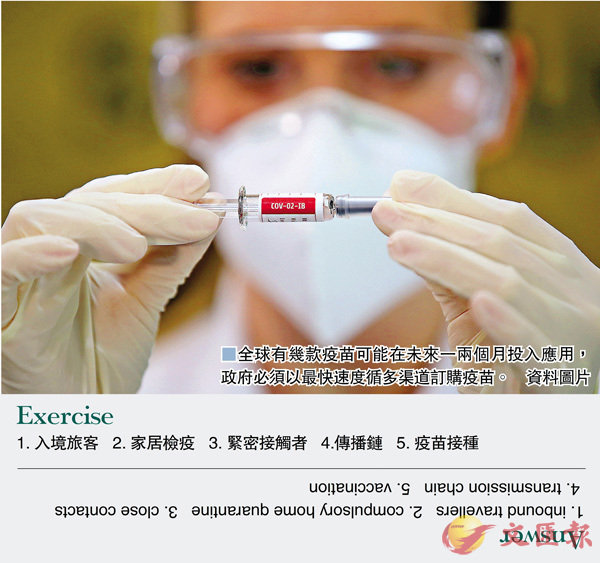
原文
食衞局局長陳肇始在9月18日舉行記者會,介紹政府應對新冠疫情的最新防控策略,並預計冬季可能出現較第三波疫情更嚴峻的第四波疫情。特區政府必須抓緊當前疫情緩和的時機,一方面嚴格防範外來輸入,積極提升本港抗疫能力,加緊採購疫苗;另一方面在控疫的前提下,積極促成「健康碼」通關,與其他疫情受控地區啟動「旅遊氣泡」,為經濟引入活水,做好抗疫、救經濟兼顧,助本港早日渡過難關。
本港於9月18日新增3宗新冠確診病例,本地不明源頭個案再次歸零,但疫情受控仍需觀察多一段時間。政府強調吸取第三波疫情教訓,加上現時海外疫情仍然嚴峻,本港仍然要嚴謹防疫,不會如6月時大幅放寬社交距離限制。
回顧7月初爆發的第三波疫情,專家分析原因在於自海外輸入,同時本港放寬限聚令過快,導致疫情快速惡化。如今疫情稍為緩和,特區政府必須嚴控輸入、繼續保持社交距離。本港現時出入境人員絕大部分是本港居民,這些人從外地回港之後,大部分只需要在家檢疫,名義上是強制居家隔離,但難以杜絕有不自覺的人外出,留下社區傳播隱患。截至本月初,已有41人因違反檢疫令被法庭定罪。本港現時每日仍有數以千計人員入境,只要有少數人不自覺遵守居家隔離,隨時會引發社區爆發。
參考內地、澳門的做法,均實施集中隔離檢疫,值得特區政府參考,吸取別人成功的抗疫經驗,加強對入境人員的檢疫限制。特首林鄭月娥透露,竹篙灣檢疫中心月中起投入服務,另外特區政府已經找到整幢酒店用作檢疫。檢疫場所充足,應對入境人員尤其來自印度、美國、巴西等高風險國家及地區的人士實施集中檢疫。
另一方面,經過普及社區檢測,本港檢測工作累積經驗、提升了能力,現時在必要時,本港已可每日處理數萬個樣本。特區政府應持續加強對高危群組的檢測,追蹤緊密接觸者,一旦發現有小型爆發,馬上對高危地點及行業展開大規模檢測,務求盡快撲滅「火頭」。
另外,全球有幾款疫苗可能在未來一兩個月投入應用,政府必須以最快速度循多渠道訂購疫苗,尤其是向內地採購,為控制疫情作好準備。
本港經濟受疫情影響,多個行業如旅遊、酒店、航空、零售等掙扎求存。特區政府已宣布重開酒吧、卡拉OK、主題公園等場所,晚市堂食亦延長至午夜12點,但要保證務求防疫、復市兩不誤。政府亦應積極與廣東、澳門實現「健康碼」通關,推進與周邊疫情受控地區的「旅遊氣泡」計劃,爭取盡快實現由少到多的試探式開放,為本港經濟引入活水。
( 摘錄自香港《文匯報》社評
2020-9-19)
譯文
Secretary for Food and Health Sophia Chan Siu-chee held a press conference on 18 September to introduce the government's latest pandemic prevention and control strategies in dealing with the Covid-19 pandemic. According to Chan, a fourth wave epidemic that is more severe than the third may occur in the coming winter. As the pandemic mitigates, the SAR government must take this window of opportunity and act swiftly. On the one hand, strict measures must be put in place to prevent imported cases, and procurement of vaccines must also be stepped up to boost anti-epidemic capabilities. On the other hand, the health code system should be implemented once the pandemic stabilises, and "travel bubbles" with those regions that have also brought the pandemic under control should be established. With new vigour being injected into the economy and the fight against Covid-19 also properly attended to, Hong Kong could ride out the storm sooner.
Although there were only three new confirmed cases of Covid-19 in Hong Kong on 18 September, with local cases of unknown origin once again returning to zero, it is still too early to say that the pandemic in Hong Kong has been brought under control. As Covid-19 is still raging in many parts of the world, the government has emphasised that it will draw experience from the third wave of the epidemic, and will not drastically relax social distancing restrictions as it did in June.
According to experts, the third wave of the epidemic that broke out in early July originated from imported cases, and eventually spread rapidly because social distancing measures were relaxed too soon. Now that the pandemic situation is starting to improve, the government must remain vigilant against imported cases and continue to enforce social distancing. Currently, the majority of people who enter and exit Hong Kong are local residents. Most of them are only required to quarantine at home when they come back from abroad. Even though home quarantine is compulsory, some irresponsible people would break the rules and potentially threaten the community. Up until early September, 41 had already been convicted by court for breaching compulsory quarantine order. As thousands of people cross the boundary every day, a handful of irresponsible people could trigger community outbreaks at any time.
Centralised quarantine has been the main prevention and control measure in both mainland China and Macau. The government should learn from the success of others and strengthen quarantine measures on inbound travellers. According to Chief Executive Carrie Lam Cheng Yuet-ngor, the new quarantine facilities at Penny's Bay could be put in use in mid-September, while another hotel building is also going to be turned into a quarantine centre. As there are now sufficient quarantine facilities in Hong Kong, the government should enforce centralised quarantine measures on inbound travellers, especially those who come from high-risk countries and regions such as India, the US and Brazil.
After launching the universal community testing programme, Hong Kong has accumulated valuable experience and stepped up its capabilities to be able to conduct tens of thousands of tests in a single day. The government should promote regular testing for high-risk groups and trace those who are identified to have close contact with Covid-19 patients. Once a small-scale outbreak occurs, mass testing must be conducted swiftly in high-risk groups and locations so as to nip it in the bud.
Also, a number of vaccines that are under development around the world should be available in the coming month or two. To control the pandemic, the government must secure those vaccines with utmost speed through varied channels, especially mainland China.
As the Covid-19 pandemic ravages the local economy, sectors like tourism, hospitality, aviation and retail are left struggling for survival. Even though the government has already decided to reopen pubs, karaoke lounges and theme parks, and that dine-in services are also extended to midnight, a balance must be struck between the economy and pandemic control.
To that end, the government should expedite the resumption of traffic between Guangdong, Macau and Hong Kong with the implementation of the health code system. "Tourism bubbles" should also be established with neighbouring regions that have contained the Covid-19 pandemic. The gradual resumption of connection with the outside world should bring vitality to the Hong Kong economy.
■Jeffrey Tse

